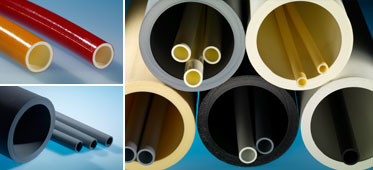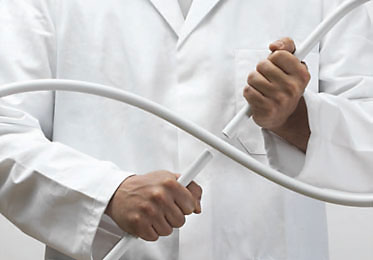PB-1 Basic Facts
PB-1 piping installed in Europe for underfloor heating (early 70's) and district energy (early 80's) are still operating successfully.
-
Polybutene-1 (PB-1) has been widely used in piping and plumbing applications in Europe and Asia for over 40 years and conforms to European standards and homologation/qualification requirements
(Standards Accreditation - download). - PB-1 pipes can be assembled using push-fit and compression fittings and using a variety of welding techniques including socket fusion, electro fusion and butt welding for large diameter pipes.
- PB-1 pipes used for drinking water and heating pipe systems are corrosion-free.
-
 Pipework of up to 50mm in diameter is supplied in coiled lengths of up to 500 metres, allowing long pipe runs to be installed without the need for connectors.
Pipework of up to 50mm in diameter is supplied in coiled lengths of up to 500 metres, allowing long pipe runs to be installed without the need for connectors. - PB-1 pipe applications installed in Europe for underfloor heating (since the early 1970s) and district energy (since the early 1980s) are still operating successfully.
- No chemicals, including solders, fluxes or greases are required for the installation of PB-1 piping systems.
-
As with all non cross-linked polymers from the Polyolefin family, Polybutene-1 is completely recyclable.
PB-1 Material
- Polybutene-1 chemical name: In the past, this polymer has been referred to as polybutylene, polybutene and PB, as well as its chemically correct name, Polybutene-1 (abbr.: PB-1).
- PB-1 is a member of the polyolefin family of thermoplastic materials which also includes polyethylene and polypropylene.
- The properties of PB-1 can be tailored by copolymerisation with PE or PP to create random copolymers suitable for special applications in underfloor heating and inner layers of pressure tanks.
- PB-1 has a density slightly lower than to water of 0.92 gm/cc
-
The PB-1 raw material grades are manufactured in the world's largest polybutene manufacturing plant in The Netherlands.

PB-1 Characteristics
-
 PB-1 is flexible, strong, resilient and light weight.
PB-1 is flexible, strong, resilient and light weight. - Excellent creep resistance combined with low stiffness makes PB-1 the technically preferred material for hot and cold water pipes.
- Odourless and tasteless and meets ‘contact with food’ approvals. Ideal for use in drinking water applications.
- Superior thermal and mechanical properties for end-use applications requiring high strength and flexibility over a broad temperature range.
- Highly resistant to solvents and chemicals
-
Excellent acoustic qualities and sound dampening with high absorption of “water hammer” and other noises.
PB-1 Applications
PB-1 piping systems are a vital part of modern architecture and building technology and are very suitable for applications that need high strength and flexibility over a broad temperature range.
- Pressurised hot and cold water supply systems
- District Energy lines (heating and cooling)
- Radiator connections
- Underfloor heating
- Chilled ceilings and surfaces
- Shipbuilding piping installations
- Pressurised plastic tanks
- Sprinkler systems
- Geothermal systems
- Vacuum systems
-
Medicinal gas lines
PB-1 Manufacturing
-
Polybutene-1 (PB-1) pipes and plumbing fittings can be processed on conventional injection moulding and extruding equipment.
PB-1 in Service
- Polybutene-1 (PB-1) pipes are completely corrosion-free.
- PB-1 pipes do not have problems of scale build-up and encrustation in hard water supply areas.
- PB-1 pipes are resistant to freezing temperatures due to the material's flexibility and elastic properties.
- The low thermal conductivity of PB-1 means that hot water pipes are cooler to the touch than conventional metal pipes with lower condensation providing a safer system.
- PB-1 piping systems are electrically non-conductive, providing a safer system with minimum earthing requirements.
-
Due to its flexibility, PB-1 pipes can be installed as a conduit 'pipe in pipe' system through concrete floors and walls providing a high level of maintenance security.

Polybutene is not sold by PBPSA members for use in pipe applications intended for use in North America, and those parties require their customers or distributors not to sell products made from Polybutene into pipe applications for North America.





